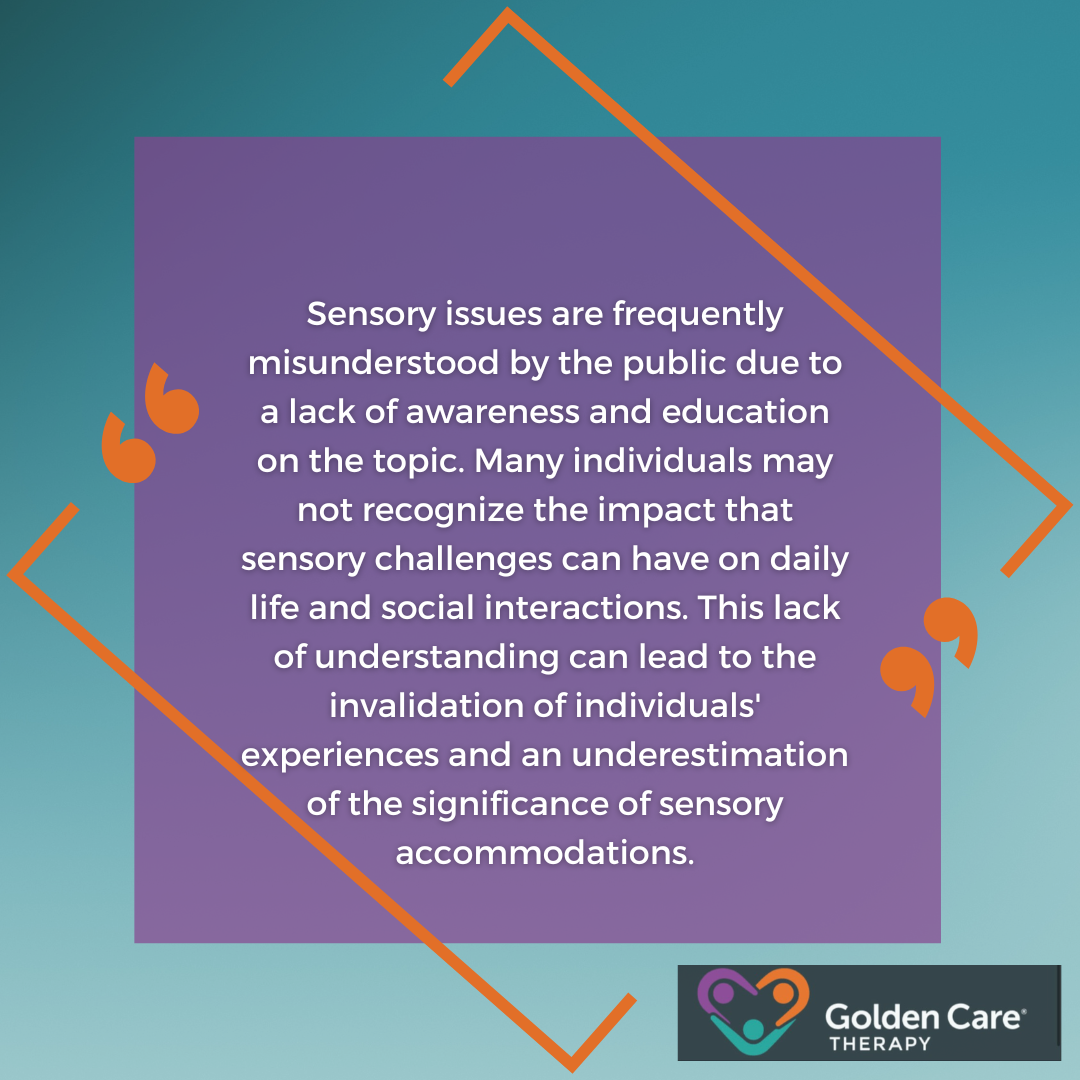Sensory issues can be one of the most challenging aspects of daily life for many individuals, yet they are often misunderstood or overlooked by those around them.
Whether it’s the overwhelming hum of fluorescent lights, the scratchiness of certain fabrics, or the intensity of loud noises, these sensory issues can be distressing.
For someone dealing with sensory sensitivities, these triggers can be as real and impactful as any physical pain, yet they often go unnoticed or dismissed in public settings.
The lack of understanding from others can lead to frustration, confusion, or even embarrassment for those affected. By taking a closer look at sensory problems, we can begin to foster more empathy and create environments that are more supportive for everyone.
Are Sensory Issues Often Misunderstood in Public?
Yes, sensory issues are often misunderstood in public. Many people may not recognize the signs or the intensity of sensory sensitivities that individuals with autism experience.
For example, bright lights, loud noises, or certain textures can overwhelm someone with sensory processing difficulties, but others may not see these stimuli as problematic.
This lack of understanding can lead to misinterpretation of behaviors, such as someone covering their ears or avoiding crowds, which may be viewed as strange or anti-social rather than as a way to cope with sensory overload.
Additionally, sensory sensitivities can be inconsistent and vary in intensity depending on the situation. What might be tolerable on one day could be unbearable on another, and this unpredictability can confuse others.
People often misunderstand that sensory processing challenges are not a matter of preference but a real and sometimes debilitating part of living with conditions like autism.
Without proper education or awareness, these sensory difficulties can easily be overlooked or dismissed, leading to frustration for both the individual and those around them.
Understanding Sensory Issues in Autism
Sensory issues in autism refer to atypical responses to sensory stimuli, where individuals may either be hypersensitive (overreactive) or hyposensitive (underreactive) to sensory input.
These sensitivities can affect any of the senses, including touch, taste, smell, sight, and sound. Children and adults with autism may experience sensory issues differently, leading to struggles in processing and responding to sensory information in their environment.
Sensory overload occurs when an individual with autism is exposed to overwhelming sensory stimuli which goes beyond their ability to regulate and filter sensory input effectively.
This can lead to heightened anxiety, meltdowns, withdrawal, or challenging behaviors as the individual attempts to cope with the sensory bombardment. Understanding the triggers of sensory overload and implementing strategies to mitigate its effects are crucial in supporting individuals with autism in managing their sensory challenges.
It is crucial to recognize the complexities of sensory issues in autism and the significant impact sensory overload can have on individuals’ daily functioning and well-being. By enhancing awareness and understanding of these sensory issues, we can foster a more inclusive and supportive environment for individuals with autism to thrive.
Public Perception
Public perception often falls prey to common misconceptions and misunderstandings as far as sensory issues go. Here, we’ll aim to shed light on the prevalent misconceptions about sensory issues and how these challenges are frequently misunderstood by the public.
Common Misconceptions About Sensory Issues
In terms of sensory issues, several misconceptions can cloud the understanding of these challenges.
One common misconception is the belief that sensory issues are merely a matter of being overly sensitive to certain stimuli. In reality, sensory issues can manifest in various ways, including both hypersensitivity and hyposensitivity to sensory input.
Another misconception is that individuals with sensory issues can easily control their reactions to stimuli. This oversimplification fails to recognize the neurological differences that underlie sensory processing disorders, making it challenging for individuals to regulate their responses to sensory information.
Furthermore, there is a misconception that sensory issues are just a phase or behavior that can be outgrown with time. In truth, sensory processing differences are often intrinsic to an individual’s neurology and may require ongoing support and accommodations.
How Sensory Issues Are Often Misunderstood

Furthermore, sensory issues are sometimes dismissed or downplayed as mere quirks or preferences, rather than legitimate challenges that can profoundly affect an individual’s well-being. This misunderstanding can contribute to feelings of isolation and frustration for those struggling with sensory processing differences.
Challenges Autistic Individuals Faced
Navigating sensory issues in the context of autism presents individuals with various challenges that impact both communication and understanding, as well as their daily lives and social interactions.
Individuals with autism may experience difficulties in effectively communicating their sensory needs and responses. This can lead to misunderstandings and frustration, as their sensory experiences may differ significantly from neurotypical individuals.
The inability to articulate their sensory struggles may result in increased anxiety and isolation, further exacerbating the challenges they face.
Moreover, understanding sensory information in their environment can be overwhelming for individuals with autism. They may have heightened sensitivity to sensory stimuli or struggle to filter out irrelevant sensory input.
This sensory processing difficulty can make it challenging for them to focus, engage in social interactions, or participate in daily activities without feeling overwhelmed or distressed.
That said, the impact of sensory issues on everyday life and social interactions for individuals with autism should not be underestimated. Sensory challenges can disrupt routine activities such as eating, sleeping, or getting dressed, making everyday tasks more challenging.
Moreover, sensory overload in social settings can lead to sensory meltdowns or shutdowns, affecting the individual’s ability to engage with others and participate in social gatherings.
In addition, the misinterpretation of sensory-related behaviors by others can contribute to social difficulties and stigmatization. The lack of awareness and understanding surrounding sensory issues in autism can lead to misconceptions and judgmental attitudes, further isolating individuals with autism from their peers and community.

Moving Forward
As we look towards the future, promoting inclusivity and acceptance for individuals with sensory issues, particularly those in the autism spectrum, remains paramount. By fostering an environment of understanding and empathy, we can create a more supportive and inclusive society for all.
Promoting inclusivity involves recognizing and appreciating the unique experiences and challenges faced by individuals with sensory issues.
It is essential to create spaces that accommodate diverse sensory needs, allowing for greater participation and engagement. By embracing neurodiversity and valuing the perspectives of individuals with sensory sensitivities, we can build a more inclusive community that celebrates differences.
Education also plays a crucial role in dispelling misconceptions and increasing awareness about sensory issues. By providing accurate information and resources, we can foster a culture of empathy and understanding within society. Encouraging open conversations and promoting empathy towards individuals with sensory challenges helps to break down barriers and promote acceptance.
In moving forward, all individuals must play a role in promoting inclusivity, acceptance, education, and empathy toward those with sensory issues. At Golden Care Therapy, we are committed to providing high-quality autism services in Georgia, where our ABA therapy is tailored to meet each individual’s unique needs.
Don’t hesitate to reach out to us todayto learn how we can support you and your loved ones on this journey. Contact us now to get started!
Sources:



